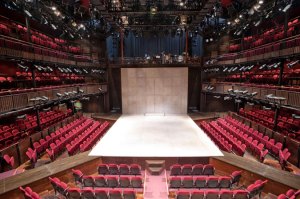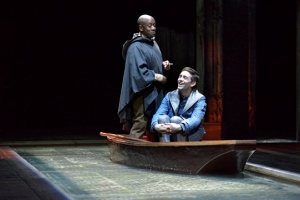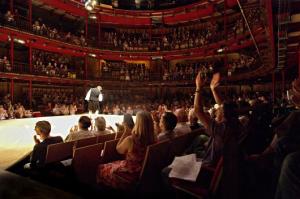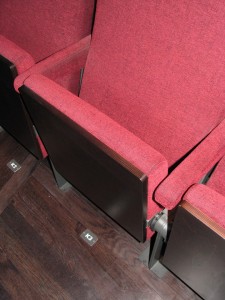As I wrote in Thursday’s post on Othello, I’ve now been able to see for the first time a stage production both live in the theatre and broadcast into cinema. I’ve wanted to do this for a while, and there’s quite a lot to say, so apologies that this a quite a long post. Pour yourself a glass of something nice, settle somewhere comfortable, and please bear with me.
I’ve been to many plays and, as I’ve written about here, seen quite a few theatre productions broadcast as “Event Cinema”. I was even in the theatre audience when the RSC did the live broadcast of Much Ado About Nothing (or Love’s Labours Won, as they titled it) earlier this year.

The Main Stage at the Royal Shakespeare Theatre, Stratford-Upon-Avon
Being in the audience during the broadcast was something I’d wanted to do for a while, just to see how it works. The main theatre at the RSC in Stratford is a “thrust stage” – the audience sits around three sides of the stage, which gives a much closer sense of involvement than you get with a traditional proscenium stage (though with some actors the front rows are in the “splash zone”, if you know what I mean). For broadcasts, the rear rows of seats on each side are removed and replaced by a camera on a track, along with a bank in the centre stalls, giving camera angles from all around. To this is added a camera on a crane to get both overhead shots and (when needed) swooping shots in the middle of the action (not so much of this in Much Ado). I had expected to be distracted by the cameras but, from our seats in the top gallery, we didn’t really notice them at all. I was actually a little frustrated – not with the production, which was excellent, but that I hadn’t paid more attention to the filming, instead being absorbed in the play and ignoring the unobtrusive cameras altogether. Which I guess is a good thing.
So how did the experiences compare with Othello? Was one better than the other? Did one show things the other didn’t, so are they complementary experiences rather than contending ones? Obviously, I’m only making these observations from a sample size of one, so I reserve the right to change my opinions if I get the chance to do this with another production.
Let’s look at some elements:
- There’s always something special about the theatre-going experience that the cinema is never going to replicate. Milling and mingling on the way in, buying and studying the programme (“Look, he was in Casualty, and so was he, and she was too….”), being shown to your seat and the gentle thrill of your first view of the stage and the set, the atmosphere as the audience assembles and the hum of conversation. You don’t get any of that in the cinema, just a printed A4 sheet with the cast list and plot synopsis.
- Set against that, in the cinema you get a pre-show interview, usually with the Director, and an interval feature. For Othello this was a filmed interview with Adrian Lester, Ray Fearon and Paterson Jospeh who all played Othello in recent years, and it’s always interesting (well, I think so) to hear good actors discussing how they tackle a role. You don’t get that in the theatre, even when you’re in the audience during the broadcast.
- For Othello I felt the broadcast didn’t do full justice to the set. In the theatre you take your time looking round and feeling the sense that the set conveys, then you see how the set transforms and can often admire the ingenuity. In Othello, in the opening of the play the floor drops to reveal that a boat in which Iago and Rodrigo are standing is in water – it’s Venice, it’s a canal, it’s a gondola – and this drew gasps because it solved the mystery of “why is there a boat on the stage?” that we’d all been wondering since we got to our seats. That didn’t really come across on film.

The gondola. Photo by Keith Pattison
- A key feature in cinema is that the director of the broadcast (as distinct from the Director of the production) is making decisions on where to point the camera, and therefore where the audience’s attention should be focused. This can work well, giving close-ups on key speeches or reactions, but in the theatre you make your own choices. You can miss things, of course, by looking in the wrong place, but you also see things the cinema audience won’t. Sometimes on film it’s too obvious – when Emilia picks up Desdemona’s discarded handkerchief, the director already has a camera focused on the handkerchief and cuts to that shot just before Emilia bends down; he didn’t need to do that, we’d have noticed her picking up the handkerchief in a wider shot, and we certainly noticed it live: your attention is naturally drawn there because the theatre Director knows it’s a key moment and ensures that’s the only thing you’re going to be watching at that instant.
- One thing I wanted to watch out for in the cinema broadcast was how distracting the “business” would be. This is a production that’s full of “business”, things going on while the actors are talking. The most extreme is Iago building a satellite dish while Othello tries to get his laptop to communicate – in the theatre all this stuff was such a distraction that you weren’t listening to the lines, in what is actually a key scene as Iago plants the first seeds of doubt about Desdemona in Othello’s mind. Here there was a clear benefit of broadcast, as the camera cut between wide shots and close-ups, so that you were forced to watch something other than the assembly and disassembly of the satellite dish (interesting though that was – I used to be an engineer)
- All films shown in cinema need to be given an age rating by the British Board of Film Classification, including live broadcasts from theatres. Othello had a rating of 12A (children under 12 must be accompanied by an adult). and I’m guessing that this accounts for a crucial decision the broadcast director made. In the theatre, there are two scenes of torture. The first, which was kept in the broadcast, is of a hooded man whose head is held under water, and then he is held down while an electric drill is turned on near him. That, seemingly, is OK for a 12A rating. Later, Othello ties Iago to a chair and puts a plastic bag over his head, suffocating him. In the theatre this is very uncomfortable: it feels a long time before Othello removes the bag; in the cinema you see Othello put the bag over Iago, but then the shot focuses only on Othello’s face – you don’t see Iago struggling to breathe. How would an audience which only saw the broadcast react, not seeing the extent of what is happening? I previously described the torture scenes as gratuitous, and I’m standing by that, but here’s a clear distinction being made, presumably to secure the 12A rating. But there were children younger than that in the theatre, and no-one near that age in the cinema. Which is interesting.
-

Joanna Vanderham as Desdemona. Photo by Keith Pattison
How much do the performances, or the perception of them change? I still felt Hugh Quarshie was underpowered as Othello, and that Lucian Msamati dominated the stage as Iago. Joanna Vanderham’s Desdemona came across better on film – in the theatre, in her early scenes I did wonder what Othello saw in her, as she seemed to go from vapid to petulant with nothing in between. On screen, I felt she came across better. The Royal Shakespeare Theatre is fairly intimate – as you can see from the pictures in this post, with the stage projected into the middle of the audience even the top gallery where we were seated is relatively close, so there’s no requirement for VERY BIG ACTING to be done. The comparison may be more acute in traditional or larger theatres where there’s more need to project to people sat much further away.
-

Bit of a cheat – this is actually The Courtyard, which the RSC used while they were rebuilding the main theatre,
What about the audiences? Seat prices at Stratford are high – not London high, but significantly more than in a cinema. Going to the theatre is that much more of an event, so there’s a degree of “getting dressed up” to go. But at Stratford there’s also an element of the “tourist trail” – people go because it’s Stratford and it’s Shakespeare and it’s the RSC, and this is what’s being shown the day they’re in the area so that’s what they’re going to see. You always get a good smattering of ages in the Royal Shakespeare Theatre – the ticket deals for young people are excellent. When we saw Othello there were two youngish children sat next to us, and we expected them to be restless and irritating, but not a bit of it – they sat rapt throughout. Which was more than could be said for the middle-aged man on our other side, who fidgeted and sighed from start to finish. I figured he was there because his wife wanted to go, but that’s the problem – there are always going to be people at the RSC who don’t really like Shakespeare or don’t really want to be there, but have been dragged along or who think it will somehow be “good” for them. I know that sounds bad – patronising? elitist? – but it doesn’t happen with the cinema. Just about everyone in the cinema has made a conscious choice to go that night to that Event because they specifically want to see it. But there are very, very few young people. I generally go to these Event Cinemas with a friend, and we’re both in our mid-fifties but it usually feels like we’re the youngest people there.
-

A seat at the Royal Shakespeare Theatre
One final point: the seats in modern cinemas are more comfortable. Generally, the Royal Shakespeare Theatre isn’t bad for seating (though others disagree), but the ones we had for Othello were narrow. Apparently there are 21 different sizes of seat in the Main Stage in order to maximise the number of seats they can achieve with that configuration of space, but ours must have been at the smaller end. Spending the whole second half with my thigh pressed unwillingly but unavoidably against that of the fidgety man next to me didn’t help me to appreciate the production any better. There was none of that in the Cineworld in Burton-on-Trent on Wednesday evening.
Is there a conclusion to this (I feel like there should be after 1600 words)? The phrase “you pays your money and you takes your choice” does apply. For me the theatre experience is better – you get more sense of atmosphere, of immediacy, of “anything could happen”. But as I’ve written before, the practicality of attending performances in theatres, coupled with the cost, mitigates against doing that on a regular basis. Broadcast into cinema works, but now I’ve had the chance to do the direct comparison, I’ve a better appreciation of what I’m missing.
Thanks for bearing with me. Hope it was worth it.

That was very interesting. I’ve always wondered when Fathom Events advertises a showing of something like this in a theater if it would be worth going to see. I quite enjoyed this. Going to pass it along to a friend who lives in Clacton-by-Sea in Essex.
LikeLiked by 1 person
It’s definitely worth giving it a go. In the UK we only seem to get opera broadcast from the USA, so I don’t know if American theatre/theater companies do broadcasts too. The RSC has Henry V coming up soon, and the National Theatre has Benedict Cumberbatch as Hamlet in October. And thanks for passing on my post – always interesting to hear from other people.
LikeLiked by 1 person
Thank you, found that very interesting. The Theatre for me in London has become too expensive what with the train fare. We have two Theatres here in Clacton-On-Sea, but the shows they put on are not quite what I would go to see.
LikeLiked by 1 person
I’m pleased you enjoyed that post. Hope you can get to some of these events. Looks like the Century Cinema in Clacton hosts them – National Theatre’s “The Beaux Strategem” this week.
LikeLiked by 2 people
Thank you for letting me know about Clacton’s Cinema.
LikeLiked by 1 person